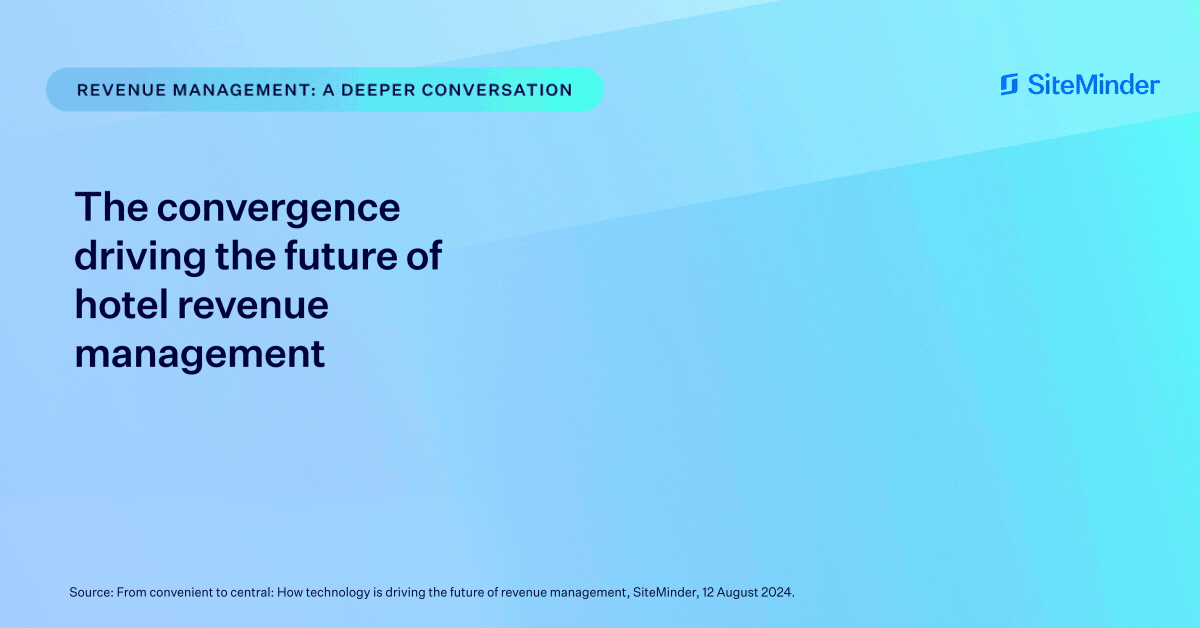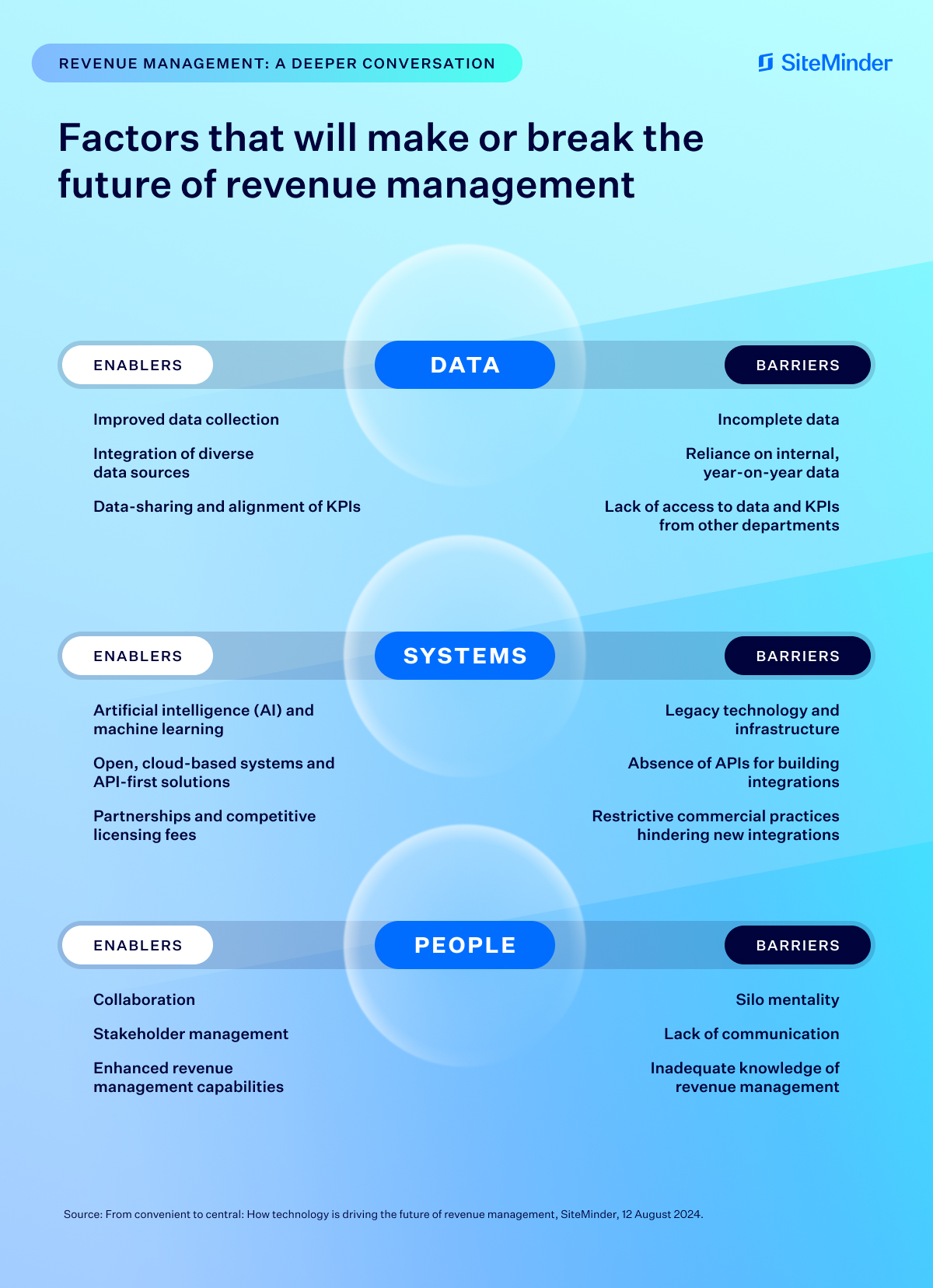It’s hard to imagine revenue management before the advent of hotel software and systems. Thanks to these solutions, today’s revenue manager can produce forecasts, distribute inventory and adjust rates with speed – a stark contrast to the manual and long drawn-out processes that defined the practice in the past.
Technology has undeniably brought a world of convenience to revenue management. And, as we look to the future, it will take on a greater and more central role as the practice undergoes a fundamental shift.
“If we talk about the future of revenue management, we should start with the very fact that it should no longer be called ‘revenue management’,” says Ira Vouk, a hospitality consultant, acclaimed author of revenue management publications and member of the HITEC Advisory Council. “We need to rename the practice to ‘revenue and profit optimisation’, and start thinking about profit-oriented metrics beyond RevPAR (Revenue Per Available Room).”
In a future that demands a greater focus on revenue and profit optimisation, technology will become increasingly pervasive, driving the convergence of data, systems and people. Indeed, this convergence is already taking place and, looking ahead, these three factors, which have traditionally operated in silos, will become more interconnected than ever before.

The role of data in revenue and profit optimisation
As hotels adopt a more profit-oriented approach to their commercial strategies, the convergence of data sources for revenue management is gaining importance. Enzo Aita, a hotelier-turned-technologist and creator of FunnelTV, an online channel dedicated to hotel technology, believes that the commercial success of hotels relies on the data they have at their disposal.
“High-quality, reliable data is critical for producing optimal outputs,” says Aita, who is also the Vice President of Business Development at HyperGuest. “If current systems are getting data that’s subpar or insufficient, they won’t be able to generate optimal results.”
Aita emphasises that having a sufficient volume of data is increasingly necessary, particularly as artificial intelligence (AI) will enhance the capabilities of revenue management systems (RMSs) and smart platforms in processing data.
“AI and machine learning will improve the quality of recommendations made by RMSs. These systems will be able to adopt open-pricing strategies where they can adjust prices based on factors like demand, competition, reputation, occupancy and historical data, depending on the data they can collect and analyse.”
For this reason, revenue managers will need to get more creative at gathering market intelligence, beyond the historical data provided by their internal systems. A richer data set will allow for a clearer picture of market conditions and improved forecasting.
Vouk emphasises, “There are so many data points available right now that we can aggregate to understand what’s actually happening in the market. Solely comparing whatever is on a property’s books to the same time last year is no longer sufficient. We need to incorporate bookings from metasearch engines, OTAs (online travel agencies), GDSs (global distribution systems), destination data, events intelligence and even data from car rentals and the TSA (Transport Security Administration).”

The need for more modern and integrated systems
If revenue and profit optimisation requires harnessing all possible data sources, it follows that a convergence of systems is likewise necessary. In this regard, Ryan Tuckerman, Group Director of Sales, Revenue and Distribution at Ovolo Hotels, describes the importance of connectivity among systems in shaping the future of revenue management.
“Not only have revenue decisions evolved drastically, but so have the systems and platforms that help us make these commercial decisions,” says Tuckerman. “For the next five years, advancements in technology will definitely influence the practice as we’re seeing a shift in the way that these systems will be connected with each other.”
Yet, despite the industry recognising the need for better connectivity, its struggles with a fragmented tech ecosystem persist. Citing the issue of integration among RMSs and property management systems (PMSs) as an example, Aita notes, “A significant hurdle faced by the industry is the sheer number of PMSs that an RMS needs to connect with in order to work effectively. We’re still seeing a number of technical and commercial barriers to integration on the part of PMSs. It’s almost like these platforms don’t want people to step into their garden and prefer to keep their clients within their perimeters.”
In light of these integration challenges, the industry must work to remove barriers that prevent revenue managers from receiving strategic, real-time insights that accelerate their shift towards profit optimisation.
More importantly, ensuring a convergence of systems will greatly empower independent accommodation properties, a vital segment that accounts for the majority of the global hotel industry but is crippled by a lack of revenue management resources and capability. With more integrated systems, these properties will be able to perform forecasting and optimisation – on par with their large hotel chain counterparts – and acquire revenue management skills in the process.
However, the systems available to these providers have to be automated and integrated into their workflows. As Vouk explains, “The brains behind this technology will need to be very smart because this segment will rely on automation quite a lot. This is where AI comes in, specifically machine learning, which will gather important data from all sources, calculate forecast and optimisation decisions and push these into the PMS.”
The revenue manager of tomorrow
As with many data-driven professions, there has been much debate within the hotel industry on the role of AI and, specifically, whether it will enable or eradicate today’s revenue managers. Diego De Ponga, the current CEO at Port Hotels and former Corporate Director of Revenue Management at Palladium Hotel Group, believes that it ultimately comes down to the ability of revenue managers to evolve at the same pace as the fast-evolving environment around them.
“Revenue managers need to understand the whole hotel, incorporate distribution and cost strategies into a property’s incomes and understand how income flows to profits. If you are able to control that, it won’t be possible for AI to change your job. But if you only measure your work through ADR, if you don’t take care of costs and if your job is only about checking competitors and increasing prices, you’re not going to have a job in two years,” says De Ponga.

Tuckerman echoes this sentiment. He notes that with the changes in today’s practice, the revenue manager of tomorrow should influence much more than just pricing and inventory management, but a hotel’s entire business strategy as well.
“Gone are the days when revenue managers were spending 80% of their time generating reports,” says Tuckerman. “Being a revenue manager now is about improving your position and changing the future. It’s about analysing the data, forming the insights and then taking action.”
Given the growing importance of adopting a comprehensive view of hotel operations, Tuckerman highlights that a successful revenue manager in the future must learn to connect with other departments, especially those which are commercially-oriented.
“A revenue manager five to ten years ago could hide behind the spreadsheet and not engage as much as required now, but with the rise of OTAs and key distribution partners that have much more of a commercial approach, the revenue manager’s mindset needs to get onboard.
“The people leading the forefront in revenue management will have a mixed skill set of revenue, distribution and sales, and they’re able to leverage these internal partners as required. The focus for a successful revenue and distribution department is having that holistic approach to driving revenue.”